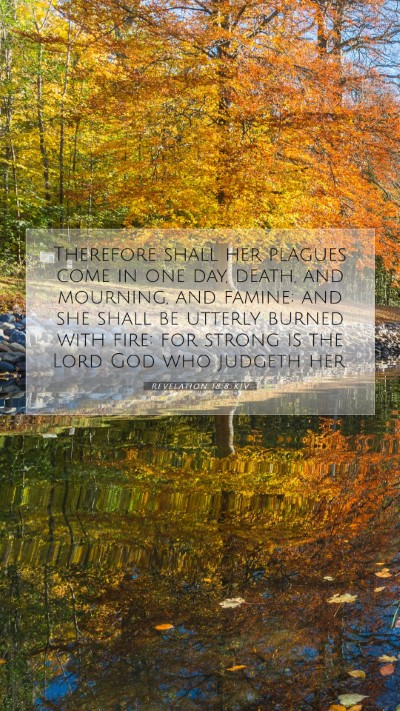Bible Verse Commentary: Revelation 18:8
Verse Text: "Therefore shall her plagues come in one day, death, and mourning, and famine; and she shall be utterly burned with fire: for strong is the Lord God who judgeth her." - Revelation 18:8
Overview and Context
The Book of Revelation is a profound prophetic message attributed to the Apostle John, detailing visions of the end times, the final judgment, and the ultimate victory of God over evil. In chapter 18, the focus shifts to the fall of Babylon, a symbol of worldly corruption and moral decay. Revelation 18:8 serves as a key statement regarding the judgment that will befall this entity, highlighting God's sovereignty and the certainty of divine retribution.
Meaning of the Verse
This verse encapsulates the immediate and severe consequences that will befall Babylon—representing both a literal city and a metaphor for sinful influences in the world. The plagues mentioned are indicative of death, mourning, and famine, all pointing to the catastrophic results of divine judgment.
- Death: A stark reminder of the ultimate consequence of sin and rebellion against God.
- Mourning: The lamentation that arises from devastation, both physically and spiritually.
- Famine: A symbol of deprivation that results from a cursed and forsaken land.
As noted in commentary by Matthew Henry, this verse not only announces calamity but serves as a warning about the inevitable downfall of those who oppose God’s will.
Insights from Public Domain Commentaries
Matthew Henry's Commentary
Matthew Henry elaborates on the swiftness of the judgment—"in one day" emphasizes the suddenness with which God's judgment can manifest. He notes the comprehensive nature of God's assessment, wherein even the mightiest of earthly powers are brought low when they stand against the Almighty.
Albert Barnes' Notes
Albert Barnes reflects upon the nature of the plagues, asserting that they represent the culmination of God’s wrath against iniquity. He underscores the phrase "strong is the Lord God," reinforcing the belief that divine authority ultimately prevails. Barnes accentuates the imagery of fire, indicating not merely the destruction of physical structures, but a purification process through divine judgment.
Adam Clarke's Commentary
Adam Clarke offers insight into the symbolism of "fire" used in this verse. He asserts that fire often symbolizes final judgment in biblical texts, illustrating the purification that comes through destruction. Clarke emphasizes that the severity of these judgments correlates with the depth of Babylon's sins, which had accumulated over time.
Cross References
- Isaiah 47:9: "But these two things shall come to thee in a moment, in one day..." emphasizes sudden judgment.
- Lamentations 3:22-23: God's mercies are renewed every morning, contrasting with the judgment in Revelation.
- 2 Peter 2:6: God condemning the cities of Sodom and Gomorrah as an example of impending judgment.
- Jeremiah 51:8: Reference to Babylon's destruction and its swift demise.
- Matthew 3:12: The use of fire for judgment and purification, aligning with Revelation themes.
Application and Relevance
This verse challenges readers to reflect upon the consequences of moral and spiritual disobedience. The imagery serves as a stern warning of the dangers of aligning with worldly pursuits that oppose God. Believers are called to seek alignment with God's purposes, leading a life in contrast to Babylonian ideologies.
For those studying the Bible, this verse serves as an entry point for discussing broader themes of judgment, divine sovereignty, and redemption found throughout Scripture. It is crucial for Bible study groups, as it offers an opportunity to explore how such themes operate within both the Old and New Testaments.
Conclusion
Revelation 18:8 illustrates the certainties of judgment that come upon those who embrace a life in opposition to God's plans. The convergence of concepts such as death, mourning, and famine warns believers against the vices of the world, reminding them of the strong and sovereign nature of God. For anyone seeking deeper Bible verse meanings or Bible verse interpretations, this verse encourages an understanding that resonates throughout the entire biblical narrative.


